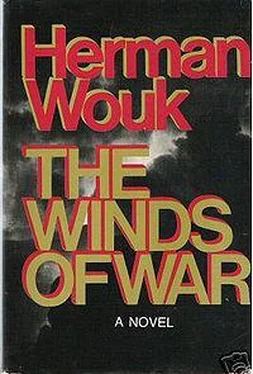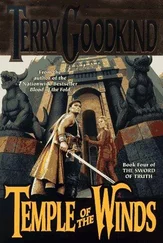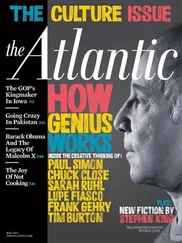Herman Wouk - The Winds of War
Здесь есть возможность читать онлайн «Herman Wouk - The Winds of War» весь текст электронной книги совершенно бесплатно (целиком полную версию без сокращений). В некоторых случаях можно слушать аудио, скачать через торрент в формате fb2 и присутствует краткое содержание. Год выпуска: 1971, Издательство: Collins, Жанр: Историческая проза, на английском языке. Описание произведения, (предисловие) а так же отзывы посетителей доступны на портале библиотеки ЛибКат.
- Название:The Winds of War
- Автор:
- Издательство:Collins
- Жанр:
- Год:1971
- ISBN:нет данных
- Рейтинг книги:4 / 5. Голосов: 1
-
Избранное:Добавить в избранное
- Отзывы:
-
Ваша оценка:
- 80
- 1
- 2
- 3
- 4
- 5
The Winds of War: краткое содержание, описание и аннотация
Предлагаем к чтению аннотацию, описание, краткое содержание или предисловие (зависит от того, что написал сам автор книги «The Winds of War»). Если вы не нашли необходимую информацию о книге — напишите в комментариях, мы постараемся отыскать её.
About the Author
Herman Wouk's acclaimed novels include the Pulitzer-Prize winning
;
;
;
;
;
; and
.
The Winds of War — читать онлайн бесплатно полную книгу (весь текст) целиком
Ниже представлен текст книги, разбитый по страницам. Система сохранения места последней прочитанной страницы, позволяет с удобством читать онлайн бесплатно книгу «The Winds of War», без необходимости каждый раз заново искать на чём Вы остановились. Поставьте закладку, и сможете в любой момент перейти на страницу, на которой закончили чтение.
Интервал:
Закладка:
The U-boat commander spread his hands. “I don’t want to drive a wedge in Anglo-American friendship.”
A whistle blasted as they spoke, and workmen came trooping off the boats and docks, and out of the sheds. The road to the gate was soon thronged with them. They came boiling out of the U-boat, up the gangway. “The old navy yard hazard,” Henry said. “Run for your life at five o’clock, or they’ll trample you to death.”
Grobke laughed. “All civilians are the same.”
Tudsbury said, “Well, in my next broadcast I’ll have to say that the U-boat command is humming like damn all. I hope they’ll take notice in London.”
“Just tell them what you saw.” Grobke shook his hand through the car window. “We want to be friends. We know you have the greatest navy in the world. These silly little boats can do a lot of damage for their size, that’s all. One of my officers will drive you to your hotel.”
Since workmen were jamming the gangway, Grobke grinned at Henry, and pointed a thumb toward the plank on the other side of the dock. Pug nodded. The German with a gesture invited him to go first. It was a very long drop, something like seventy feet, to the greasy puddles in the concrete dock. Pug made his way around the rim and walked down the shaky paint-spotted plank, trying to look easier than he felt. Stolid eyes of side boys in white watched from below. As he set foot on deck, they snapped to attention. Grobke stepped off the rattling plank with a laugh. “Well done, for two old blokes.”
U-46 looked much like an American submarine, but the cleanliness, polish, and order were unusual. A United States ship in dry dock, with civilian workmen aboard, soon became squalid and dirty. No doubt Grobke had ordered a cleanup for the American visitor, which Pug appreciated, being himself a spit-and-polish tyrant. Even so, he had to admire the German display. The diesels looked as though they had never turned over, their red paint and brass fittings were unsullied by a grease spot, and the batteries seemed fresh from the factory. The sailors were starched pretty fellows, almost a crew for a nautical musical comedy. As for the U-boat design, when you took the essential spaces and machines of a war vessel and stuffed them into the sausage casing of one long tube, the result was the same in any country: change the instrument legends to English, move the captain’s cabin from port to starboard, add two feet to the wardroom, alter a few valve installations, and you were in the Grayling .
“Smells pretty good,” he said, as they passed the tiny galley, where cooks in white were preparing dinner and somehow managing to perspire neatly.
Grobke looked at him over his shoulder. “You wouldn’t care to eat aboard? It’s awfully cramped, but these chaps don’t eat too badly.’
Pug had a dinner appointment with the Tudsburys, but he said at once, “I’d be delighted.”
So he dined elbow to elbow with the captain and officers of the U-boat in the narrow wardroom. He enjoyed it. He was more at home here than in his silk-walled dining room in Berlin. The four young officers were thin-lipped, ruddy, blond, shy; like Americans in their features, but with a different look around the eyes, more intense and wary. They sat silent at first, but soon warmed to the American’s compliments about the boat, and the joking of Grobke, who got into an excellent mood over the food and wine, Stories passed about the stupidity and laziness of navy yard workmen. One of Pug’s best yarns, an incident of crossed-up toilet plumbing on the West Virginia brought uproarious laughter. He had noticed before the German taste for bathroom humor. The officers told tales which they considered comic, of their early training: first about the cleaning of latrines, then of electric shocks to which they had had to submit without flinching while their reactions were filmed; exposure to cold and heat past the point of collapse; knee bends until they dropped; the “Valley of Death” cross-country run up and down hillsides, wearing seventy-pound loads and gas masks. An officer emerged the better, they said, from such ordeals. Only Grobke disagreed. That Prussian sadism was old-fashioned, he asserted. In war at sea, initiative was more important than the blind submission that the ordeals implanted. “The Americans have the right idea,” he said, either because he sensed that Pug was shocked, or out of maverick conviction. They feasted on cabbage soup, boiled fresh salmon, roast pork, potato dumplings, and gooseberry torten . Obviously Grobke had ordered up this banquet on the chance that Pug might stay.
Streaks of red sunset showed through the black rain when Henry and Grobke left the submarine. On the dock some crewmen, naked except for trunks, were wrestling inside a cheering circle, on gray mats laid over the crane tracks. Henry had seen everywhere this love of young Germans for hard horseplay. They were like healthy pups, and these U-boat men looked stronger and healthier than American sailors.
“So, Henry, I suppose you join your English friend now?”
“Not if you have any better ideas.”
The German slapped him on the shoulder. “Good! Come along.”
They drove out through the gate. “Damn quiet after five o’clock,” said Pug.
“Oh, yes. Dead. Always.”
Pug lit a cigarette. “I understand the British are working two and three shifts now in their yards.”
Grobke gave him an odd look. “I guess they make up for lost time.”
A couple of miles from the base, amid green fields near the water, they drove into rows of wooden cottages. “Here’s where my daughter lives,” Grobke said, ringing a doorbell. A fresh-faced young blonde woman opened the door. Three children, recognizing Grobke’s ring, ran and pounced on the paper-wrapped hard candies he handed out. The husband was at sea on maneuvers. On an upright piano in the tiny parlor stood his picture: young, long-jawed, blond, stern. “It’s good Paul is at sea,” Grobke said. “He thinks I spoil the kids,” and he proceeded to toss them and romp with them until they lost their bashfulness in the presence of the American, and ran around laughing and shrieking. The mother tried to press coffee and cake on the guests, but Grobke stopped her.
“The commander is busy. I just wanted to see the children. Now we go.”
As they got into the car, looking back at a window where three little faces peered out at him, he said: It’s not much of a house. Not like your mansion in the Grunewald! It’s just a cracker box. The German pay scale isn’t like the American. I thought you’d be interested to see how they live. He’s a good U-boat officer and they’re happy. He’ll have a command in two years. Right away if there’s war. But there won’t be war. Not now.”
“I hope not.”
“I know . There is not going to be war over Poland. So? Back to Swinemünde?”
“I guess so.”
As they drove into the small coastal town, Pug said, “Say, I could stand a beer. How about you? Is there a good place?”
“ Now you’re talking! There’s nothing fancy, not in this boring town, but I can take you where the officers hang out. Isn’t Tudsbury expecting you?”
“He’ll survive.”
“Yes. Englishmen are good at that.” Grobke laughed with transparent pleasure at keeping the American naval attaché from the famous correspondent.
Young men in turtleneck sweaters and rough jackets sat at long tables in the dark, smoky, timbered cellar, bellowing a song to concertina accompaniment played by a strolling fat man in a leather apron. “Jesus Christ, I have drunk a lot of beer in this place, Henry,” said Grobke. They sat at a small side table under an amber lamp. Pug showed him pictures of Warren, Byron, and Madeline. After a couple of beers, he told of his worry over Warren’s involvement with an older woman. Grobke chuckled. “Well, things I did when I was a young buck! The main this is, he’ll be an aviator. Not as good as a submariner, but the next best thing, ha ha! He looks like a smart lad. He’ll settle down.”
Читать дальшеИнтервал:
Закладка:
Похожие книги на «The Winds of War»
Представляем Вашему вниманию похожие книги на «The Winds of War» списком для выбора. Мы отобрали схожую по названию и смыслу литературу в надежде предоставить читателям больше вариантов отыскать новые, интересные, ещё непрочитанные произведения.
Обсуждение, отзывы о книге «The Winds of War» и просто собственные мнения читателей. Оставьте ваши комментарии, напишите, что Вы думаете о произведении, его смысле или главных героях. Укажите что конкретно понравилось, а что нет, и почему Вы так считаете.












